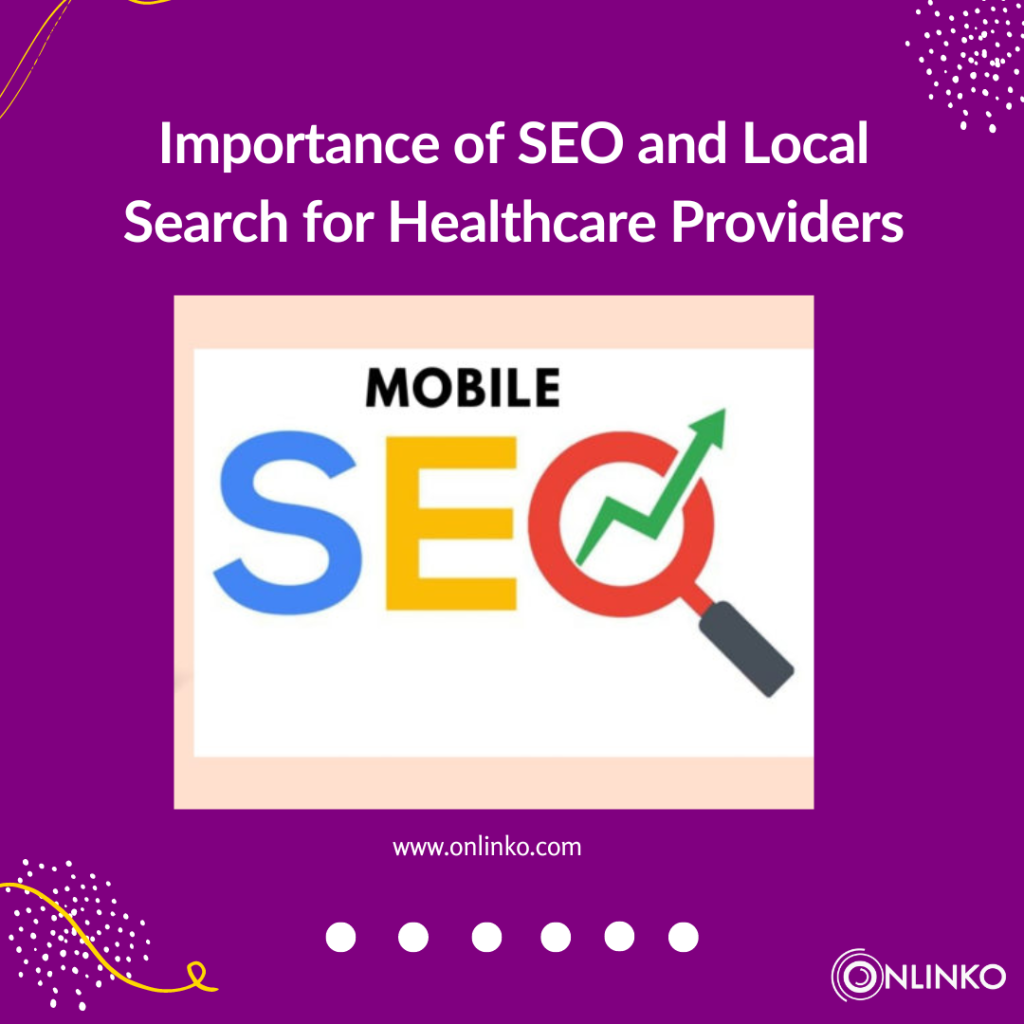In today’s digital age, the internet plays a crucial role in shaping consumer behavior, and the healthcare industry is no exception. As patients increasingly turn to online resources to find healthcare services and information, the importance of search engine optimization (SEO) and local search for healthcare providers cannot be overstated.
Onlinko being one of the most trusted platforms for digital marketing for healthcare providers in Nigeria, lays stress on the significance of SEO and local search strategies in enhancing the online visibility, patient acquisition, and overall success of healthcare organizations.
What is SEO?
Search Engine Optimization (SEO) is a digital marketing strategy aimed at improving a website’s visibility and ranking on search engine results pages (SERPs) for relevant keywords and phrases.
For doctors and hospitals, SEO plays a pivotal role in attracting and engaging patients in the digital age.
By optimizing their websites with relevant medical keywords, creating high-quality content, and ensuring technical excellence, healthcare providers can increase their online visibility.
As a result, potential patients searching for specific medical services or specialties are more likely to find and choose the doctor’s practice or hospital.
A well-executed SEO strategy enhances patient acquisition by driving qualified leads to the website, increasing appointment bookings, and building patient trust and credibility.
It also allows healthcare providers to target specific patient demographics and meet patients where they are searching, staying ahead of the competition in a rapidly evolving digital landscape.
Ultimately, SEO enables doctors and hospitals to deliver better healthcare experiences by effectively connecting with patients and providing valuable medical information through their online presence.
How SEO & Local Search Helps:
1. Enhanced Online Visibility
SEO techniques focus on optimizing a healthcare provider’s website and content to rank higher in search engine results and are considered one of the best strategies for digital marketing for doctors.
By implementing relevant keywords, creating high-quality content, and improving the website’s technical aspects, healthcare providers can increase their chances of appearing on the first page of search results.
Some of the best healthcare marketing companies in Nigeria focus on building a prominent online presence to ensure that potential patients can easily find and connect with the healthcare facility or practice, establishing the institution as a trustworthy and authoritative source in the industry.
2. Improved Patient Acquisition
Patients’ journey to finding the right healthcare provider often begins with an online search. A robust SEO strategy helps healthcare organizations attract more qualified leads and convert them into patients.
When patients search for specific medical services or specialties, a well-optimized website increases the likelihood of appearing in the search results, capturing potential patients’ attention and driving them to make appointments.
By ensuring that relevant and accurate information is readily available online, healthcare providers can make a positive first impression and instill confidence in patients seeking care.
3. Targeted Marketing for Specific Patient Demographics
One of the key advantages of SEO is its ability to target specific patient demographics.
Healthcare providers can optimize their websites and content to align with the needs and preferences of their target audience.
For instance, a pediatric clinic can focus on keywords related to children’s health, while a geriatric practice can emphasize keywords related to elderly care.
By catering to the specific interests of their target patients, healthcare providers can better connect with their audience and stand out from their competitors.
4. Local Search & SEO: A Game-Changer for Healthcare Providers
Local search optimization is a critical aspect of SEO for healthcare providers.
When patients seek medical services, they often include location-specific terms in their search queries, such as “Dental Clinic near me” or “family doctor in [city].”
By incorporating location-based keywords and creating localized content, healthcare providers can improve their chances of appearing in local search results.
This is particularly advantageous for attracting patients from the surrounding community who are more likely to visit nearby healthcare facilities.
5. Mobile-First Approach for a Mobile-First Generation
Many patients rely on their smartphones and tablets to find healthcare information, book appointments, and access medical resources.
By optimizing websites for mobile devices, healthcare providers can ensure a seamless user experience for patients and potential patients alike.
Furthermore, Google and other search engines prioritize mobile-friendly websites, making it crucial for healthcare providers to invest in responsive design and mobile optimization for improved search engine rankings.
6. Building Trust and Credibility
An SEO-optimized website with valuable and accurate content fosters trust and credibility among patients.
Patients are more likely to trust healthcare providers whose websites appear on the first page of search results, as this indicates authority and reliability.
By providing informative and educational content, healthcare organizations position themselves as thought leaders in their field, further solidifying patient trust.
7. Measuring Success with Analytics
SEO efforts can be quantified and measured using various analytics tools.
Healthcare providers can track website traffic, patient inquiries, and conversions resulting from SEO strategies.
This data provides valuable insights into the effectiveness of different SEO techniques, allowing for continuous improvement and optimization.
8. Navigating Competition and Evolving Consumer Behaviour
As consumer behavior evolves, healthcare providers must adapt to remain competitive.
Consumers are increasingly relying on online research to make informed decisions about their healthcare.
By implementing strong SEO and local search strategies, healthcare providers can meet patients where they are searching, stay ahead of the competition, and capture new patient opportunities.
Conclusion
The importance of SEO and local search for healthcare providers cannot be overstated. A robust SEO strategy enhances online visibility, attracts more patients, and builds trust and credibility.
By focusing on local search optimization, healthcare providers can target specific patient demographics and attract patients from their surrounding communities.
Embracing a mobile-first approach ensures a seamless user experience for patients using mobile devices for healthcare searches.
Through analytics, healthcare organizations can measure the success of their SEO efforts and continuously improve their online presence.
As the healthcare industry continues to evolve in the digital era, SEO and local search will remain fundamental pillars for successful patient acquisition and engagement for healthcare providers.

